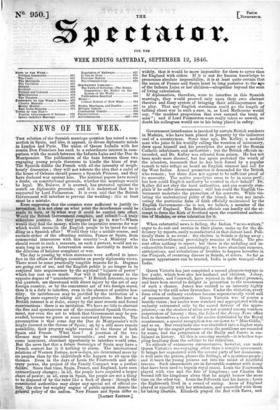NEWS OF THE WEEK.
Even supposing that the occasion were sufficient to justify in- tervention, it is not clear on what point the interference could be made to turn, or in what way it could be carried into effect. Would the British Government complain, and submit ?—A truly ridiculous position. Are they prepared to go to war ?—Where would they find the money, where the imperative reasons for war which would reconcile the English people to be taxed for med- dling in a Spanish affair ? Would they take a middle course, and exclude either of the offending nations, France or Spain, from commercial intercourse with this country ?—A Ministry who should resort to such a measure, on such a pretext, would not re- main long in power. Intervention inevitably nevitably to result in the dilemma of helpless complaint or war. The day is passing by when statesmen were suffered to inter- fere in the affairs of foreign countries on purely diplomatic views. There must be some practically tangible reasons for it. Dogmas are going out of use, and the English public is no longer to be conjured into acquiescence by the mystical "balance of power" which has cost us so much. Nor will it blindly assent to the opposite dogma of" nonintervention." If British interests, in neu- tralquarters, are threatened with direct injury by the act of any
• foreign country, or by the concurrent act of two foreign states, then it is a duty to interfere, even in the absence of positive hos- tility. Or interference may be justified by the invitation of a foreign state expressly asking aid and protection. But here no British interest is at stake, except by the most remote and forced• constructions : there is no invitation. We have no title to obstruct the free and spontaneous act of the constituted Spanish Govern- ment, nor even the act to which that Government may be per- suaded, because we guess at some untoward future results. The presumption is that- some day the Duc de Montpensier's wife might succeed to the throne of Spain ; or, by a still more remote possibility-, their progeny might succeed to the throne of both Spain and France. What then ? A junction of the two -thrones may be considered impossible ; and were it to be- =come imminent, abundant opportunity to interfere would arise. But the mere fact that a future Sovereign of Spain may have a French consort has in it nothing to alarm. The international relations of Western Eurepel now-a-days, are determined more by its peoples than by the individuals who happen to sit upon the thrones. Even in the days of Louis the Fourteenth and arbi- trary power, the project of the Family Compact was a perfect failure. Since that time, Spain, France and England, have seen extraordinary changes ; in all, the people have acquired a larger share' of power; in all, eyen in Spain, the people are not a thing to be disposed of by the ruler like a flock of sheep: though the constituted authorities may shape any special act of official po- licy, the slow but weighty engine of public opinion directs the general policy of the nation. Now France and Spain differ so
widely, that it would be more impossible for them to agree than for England With either. If it is not for human knowledge to pronounce absolute impossibility, it is at least quite certain that the union of France and Spain must be long posterior to the age of the Infanta Luisa:or her children—altogether beyond the scan of living calculation. If diplomatists, therefore, were to interfere in this Spanish marriage, they would proceed only upon their own abstract theories and fussy system of bringing their self-importance in- to play. That any-English statesman could go the length of talking about war in such a case is, as Lord Melbourne would say, "the maddest proposition that ever entered the brain Of man"; and if Lord Palmerston were really taken so unwell, no doubt his colleagues would see to his being placed in safety.


























